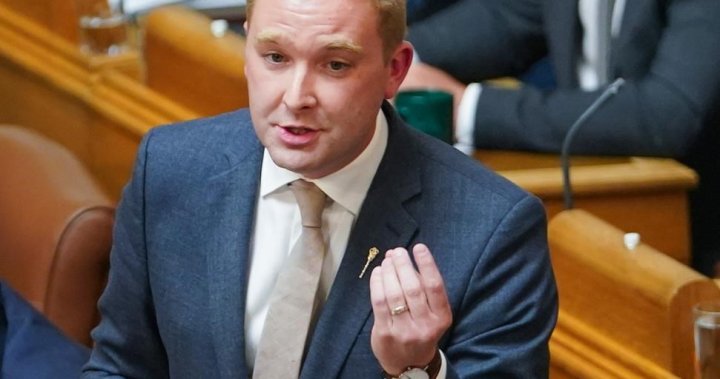Paragraph 1: The Conflict of Interest Breach and Demand for Apology
Saskatchewan’s Health Minister, Jeremy Cockrill, finds himself embroiled in controversy following a report by the province’s conflict of interest commissioner. The report concludes that Cockrill breached conflict of interest rules in 2021 due to his employment with Fortress Windows and Doors, a company owned by his in-laws, which received nearly $180,000 in government contracts that year. The company performed work for a public housing authority in North Battleford. The Opposition NDP has called for Cockrill’s resignation and plans to introduce a motion in the legislature seeking a formal reprimand, potentially a censure, for the minister.
Paragraph 2: NDP’s Criticism and Concerns Regarding Cockrill’s Conduct
The NDP’s ethics critic, Meara Conway, criticized Cockrill for not severing ties with Fortress Windows and Doors after being informed by the commissioner of his conflict of interest. The report notes that Cockrill continued his employment and even received a bonus after the notification. Conway highlighted this as a demonstration of a "flippant attitude" at best, and a sense of "entitlement" at worst. The NDP contends that Cockrill’s actions erode public trust in elected officials and underscore the importance of conflict of interest regulations.
Paragraph 3: The Commissioner’s Findings and Cockrill’s Response
Conflict of interest commissioner Maurice Herauf recommended a reprimand for Cockrill but stopped short of suggesting harsher penalties, citing the minister’s eventual compliance and lack of deliberate intent. The report acknowledges that Cockrill sought advice from the commissioner, but did not receive specific instructions regarding his employment. Cockrill accepted the findings, claiming the breach was unintentional, and accused the NDP of attempting to damage his reputation. He emphasized that the conflict of interest is no longer active.
Paragraph 4: Additional Investigations and Calls for Stronger Legislation
Herauf also investigated Cockrill’s investments in Royal Helium and Helium Evolution, concluding that no rules were breached in those instances. While Cockrill purchased shares in the companies during his tenure as a cabinet minister, the report found he recused himself from relevant cabinet discussions and did not participate in negotiations involving the companies. However, the NDP raised concerns about Cockrill’s participation in broader cabinet discussions concerning the helium industry, despite his investments. Although the commissioner deemed this acceptable, the NDP called for stricter rules requiring recusal even in broader discussions where a potential conflict of interest might exist.
Paragraph 5: Proposed Legislative Reforms and Previous Conflict of Interest Cases
The NDP plans to introduce a private member’s bill in the spring aimed at strengthening conflict of interest laws and increasing penalties for violations. Conway pointed out the discrepancy between the standards applied to civil servants and cabinet ministers, advocating for higher standards for the latter. Premier Scott Moe has expressed openness to reviewing the legislation, which has remained unchanged since 1993. This incident is not isolated, as another Saskatchewan Party member, former backbencher Gary Grewal, was found in breach of conflict of interest rules earlier this year due to his motels conducting business with the government.
Paragraph 6: The NDP’s Accusations and the Broader Political Context
The NDP has framed these incidents as a pattern of ethical lapses within the Saskatchewan Party government. They connect Cockrill’s case to Grewal’s, who did not seek re-election after his breach became public, suggesting a systemic issue within the ruling party. The NDP argues that despite being in power for 17 years and claiming to have changed, the Saskatchewan Party continues to exhibit the same problematic behavior, eroding public trust and requiring a strengthened legislative framework to address conflicts of interest.

